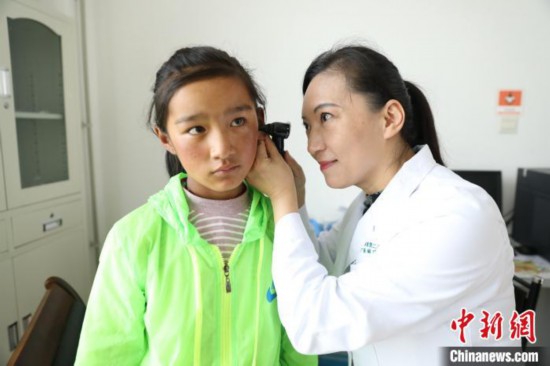Hearing-impaired children in Nyingchi, Tibet regain sound in Guangzhou

In Nyingchi City People’s Hospital, Professor Peng Hong’s team performed a hearing test on Drolma. Photo courtesy of Guangdong Second People’s Hospital.
On January 12, in the operating room of the Guangdong Second People’s Hospital, a team of otologists was performing an incredibly difficult cochlear implant surgery. The hearing test instrument showed a continuous beating wave, which was a regular “stave line”. This is the brain’s response wave after a patient hears a sound. For the Tibetan girl Drolma (a pseudonym), who is suffering from congenital deafness, it also means a “new sound” in a previously silent life.
11-year-old Drolma from Nyingchi, Tibet has been deaf since birth.
In September 2020, a medical expert and volunteer service team from Guangdong Second People’s Hospital carried out free consultation services in Nyingchi. Drolma met Professor Peng Hong, the director of Otorhinolaryngology Head and Neck Surgery during this free clinic.
At the Nyingchi City People’s Hospital, Professor Peng Hong’s team conducted a hearing test for Drolma and diagnose the cause of her condition. Drolma has very severe sensorineural deafness and is almost completely deaf. Hearing aids and other auxiliary hearing devices would not work. To help Drolma, he could only restore her hearing by cochlear implant surgery.
Due to deficiencies in local medical conditions, Professor Peng Hong suggested that Drolma come to Guangzhou for treatment.
In early January 2021, Drolma came with her family to Guangzhou.
The operation proceeded as scheduled and Drolma recovered quickly after the operation.
“Successful surgery is the first step in the rehabilitation of the hearing. The cochlear implant needs several adjustments to achieve a better ‘human-machine match’. Hearing sounds does not mean understanding language, just like we hear a strange foreign language. Similarly, Drolma still needs to undergo a certain period of debugging and language rehabilitation training to achieve the goal of ‘listening and speaking’,” Professor Peng Hong said.
It is understood that cochlear implants are currently the most effective way to treat severe deafness. After the cochlear implant is officially turned on, hearing will continue to improve with the extension of the rehabilitation period. Although Drolma has missed the optimal recovery age of 2-3 years old, as long as she can strengthen her speech rehabilitation training in the later stage, it is possible for her to restore her language communication skills.
Editor:Yanina
